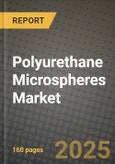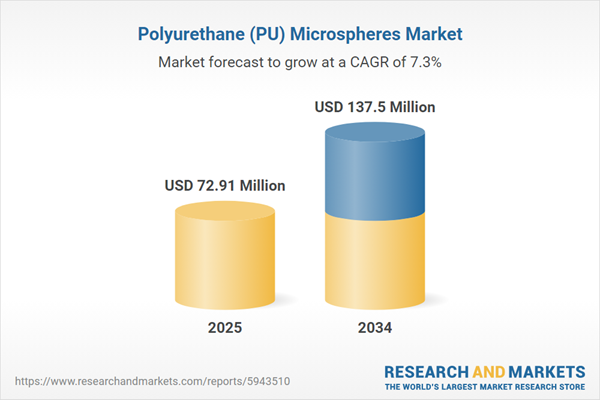Polyurethane (PU) Microspheres Market
The polyurethane (PU) microspheres market is a specialized part of advanced materials, supplying finely engineered, low-density and often functionalized micro-particles used to modify surface appearance, rheology, texture, weight and performance in coatings, adhesives, sealants, inks, cosmetics, textiles and molded/compounded plastics. PU microspheres are valued for their elastic yet durable polymer backbone, narrow particle-size control, good chemical resistance, and the ability to be made as solid, hollow or even thermally expandable grades. In coatings and inks they create soft-touch, mattifying, anti-blocking and slip effects while preserving clarity; in adhesives and sealants they act as precision spacers to control bondline thickness; in cosmetics and personal care they provide silky feel, wrinkle-blurring and controlled delivery; in lightweight composites and putties they reduce density without severely weakening the matrix. Market growth is driven by the shift toward waterborne and high-solids coatings where conventional fillers hurt flow, by packaging and electronics that need defect-free low-gloss finishes, and by brand owners in beauty and personal care seeking sensorial differentiation with regulatory-compliant ingredients. The competitive landscape includes a handful of global specialty chemical companies and several niche dispersion and toll manufacturers that compete on particle-size distribution, crosslink density, compatibility with common binders, and tailored surface chemistry. Challenges include higher cost than commodity fillers, the need for strong dispersion and storage stability, and customer demands for bio-based or low-VOC systems; suppliers able to deliver application-ready dispersions and regulatory documentation are better placed.Polyurethane (PU) Microspheres Market Key Insights
- Coatings and inks are the anchor applications. PU microspheres help formulators achieve matting, anti-blocking, scratch resistance and soft touch in architectural, wood, plastic and packaging coatings without sacrificing film strength or clarity.
- Spacing and thickness control add high-value use. In structural adhesives, optical-bonding, electronics and automotive glazing, calibrated PU microspheres act as spacers that keep bondlines uniform, improving cure consistency and final appearance.
- Cosmetics and personal care pull premium grades. Spherical, narrow-distribution microspheres with pleasant skin feel, low odor and good oil compatibility support blurring, shine control and color-cosmetics claims, so they command higher margins.
- Hollow and low-density types support lightweighting. When incorporated into putties, sealants and composites, hollow PU microspheres lower density and improve sandability while keeping toughness better than fragile glass balloons.
- Waterborne compatibility is a buying criterion. As coatings and inks move to waterborne, microspheres must disperse easily, resist sedimentation and be free of solvents and monomers that threaten low-VOC targets.
- Surface-functionalized grades widen the market. Silane-grafted, hydrophilic/hydrophobic-balanced or pigment-wettable microspheres integrate more easily into challenging systems and reduce the need for extra additives.
- Regulatory and safety dossiers matter. For cosmetics, packaging and some electronics, producers must provide detailed regulatory, food-contact or skin-safety data, favoring established suppliers.
- Cost and supply stability are hurdles. PU microspheres cost more than silica, wax or mineral mattifiers, so suppliers must prove performance per unit cost and offer reliable lead times.
- Sustainability is an emerging differentiator. Bio-based polyols, low-VOC dispersions and recyclable packaging for microsphere concentrates help customers meet their ESG and brand goals.
- Application support locks in customers. Technical service around dispersion, let-down, mill-base adjustment and compatibility with specific binders or cosmetic bases reduces trial-and-error and raises switching costs.
Polyurethane (PU) Microspheres Market Reginal Analysis
North America
Demand is led by high-performance industrial, wood and plastic coatings, automotive and transportation adhesives, and a strong personal-care sector that uses sensorial additives. Buyers emphasize consistent particle size, waterborne compatibility and complete regulatory documentation. Close technical service and short lead times are key to winning OEM and tiered-coating accounts.Europe
Stringent VOC and chemical-safety rules make low-emission, waterborne-ready PU microspheres attractive for architectural, packaging and furniture coatings. Cosmetic and personal-care brands in the region look for premium, skin-safe, microplastic-conscious solutions, pushing suppliers toward more sustainable chemistries. Local production and REACH-ready dossiers are important.Asia-Pacific
The volume growth center due to expanding coatings, packaging, electronics, printing and beauty industries in China, India, Korea and Southeast Asia. Price-performance balance is critical: many customers start with PU microspheres in higher-end SKUs before cascading to mainstream. Regional dispersers and tollers often partner with global suppliers for specialized grades.Middle East & Africa
Growing building, protective and wood-coatings markets, plus packaging and converting, create a steady pull for matting and anti-blocking additives. Hot climates require coatings with good touch and mar resistance, so PU microspheres help upgrade local formulations. Most products are imported; distributors that can stock and supply smaller lots gain share.South & Central America
Automotive refinish, furniture/wood, flexible packaging and cosmetics segments drive demand. Economic cyclicality makes customers cost-sensitive, favoring concentrated dispersions that lower logistics costs. Suppliers that provide application guides in local languages and work through established coatings and personal-care distributors can penetrate more quickly.Polyurethane (PU) Microspheres Market Segmentation
By Application
- Encapsulation
- Paints and Coatings
- Adhesives
- Cosmetics
- Others
Key Market players
Cospheric LLC, Microchem Corp., Matsumoto Yushi-Seiyaku Co. Ltd., Sekisui Chemical Co. Ltd., Kolon Industries Inc., Chase Corporation, Momentive Performance Materials, 3M Company, Merck KGaA (specialty polymers), AkzoNobel N.V., Evonik Industries AG, Clariant AG, BASF SE, Celanese Corporation, Arkema S.A.Polyurethane (PU) Microspheres Market Analytics
The report employs rigorous tools, including Porter’s Five Forces, value chain mapping, and scenario-based modelling, to assess supply-demand dynamics. Cross-sector influences from parent, derived, and substitute markets are evaluated to identify risks and opportunities. Trade and pricing analytics provide an up-to-date view of international flows, including leading exporters, importers, and regional price trends.Macroeconomic indicators, policy frameworks such as carbon pricing and energy security strategies, and evolving consumer behaviour are considered in forecasting scenarios. Recent deal flows, partnerships, and technology innovations are incorporated to assess their impact on future market performance.
Polyurethane (PU) Microspheres Market Competitive Intelligence
The competitive landscape is mapped through proprietary frameworks, profiling leading companies with details on business models, product portfolios, financial performance, and strategic initiatives. Key developments such as mergers & acquisitions, technology collaborations, investment inflows, and regional expansions are analyzed for their competitive impact. The report also identifies emerging players and innovative startups contributing to market disruption.Regional insights highlight the most promising investment destinations, regulatory landscapes, and evolving partnerships across energy and industrial corridors.
Countries Covered
- North America - Polyurethane (PU) Microspheres market data and outlook to 2034
- United States
- Canada
- Mexico
- Europe - Polyurethane (PU) Microspheres market data and outlook to 2034
- Germany
- United Kingdom
- France
- Italy
- Spain
- BeNeLux
- Russia
- Sweden
- Asia-Pacific - Polyurethane (PU) Microspheres market data and outlook to 2034
- China
- Japan
- India
- South Korea
- Australia
- Indonesia
- Malaysia
- Vietnam
- Middle East and Africa - Polyurethane (PU) Microspheres market data and outlook to 2034
- Saudi Arabia
- South Africa
- Iran
- UAE
- Egypt
- South and Central America - Polyurethane (PU) Microspheres market data and outlook to 2034
- Brazil
- Argentina
- Chile
- Peru
Research Methodology
This study combines primary inputs from industry experts across the Polyurethane (PU) Microspheres value chain with secondary data from associations, government publications, trade databases, and company disclosures. Proprietary modeling techniques, including data triangulation, statistical correlation, and scenario planning, are applied to deliver reliable market sizing and forecasting.Key Questions Addressed
- What is the current and forecast market size of the Polyurethane (PU) Microspheres industry at global, regional, and country levels?
- Which types, applications, and technologies present the highest growth potential?
- How are supply chains adapting to geopolitical and economic shocks?
- What role do policy frameworks, trade flows, and sustainability targets play in shaping demand?
- Who are the leading players, and how are their strategies evolving in the face of global uncertainty?
- Which regional “hotspots” and customer segments will outpace the market, and what go-to-market and partnership models best support entry and expansion?
- Where are the most investable opportunities - across technology roadmaps, sustainability-linked innovation, and M&A - and what is the best segment to invest over the next 3-5 years?
Your Key Takeaways from the Polyurethane (PU) Microspheres Market Report
- Global Polyurethane (PU) Microspheres market size and growth projections (CAGR), 2024-2034
- Impact of Russia-Ukraine, Israel-Palestine, and Hamas conflicts on Polyurethane (PU) Microspheres trade, costs, and supply chains
- Polyurethane (PU) Microspheres market size, share, and outlook across 5 regions and 27 countries, 2023-2034
- Polyurethane (PU) Microspheres market size, CAGR, and market share of key products, applications, and end-user verticals, 2023-2034
- Short- and long-term Polyurethane (PU) Microspheres market trends, drivers, restraints, and opportunities
- Porter’s Five Forces analysis, technological developments, and Polyurethane (PU) Microspheres supply chain analysis
- Polyurethane (PU) Microspheres trade analysis, Polyurethane (PU) Microspheres market price analysis, and Polyurethane (PU) Microspheres supply/demand dynamics
- Profiles of 5 leading companies - overview, key strategies, financials, and products
- Latest Polyurethane (PU) Microspheres market news and developments
Additional Support
With the purchase of this report, you will receive:- An updated PDF report and an MS Excel data workbook containing all market tables and figures for easy analysis.
- 7-day post-sale analyst support for clarifications and in-scope supplementary data, ensuring the deliverable aligns precisely with your requirements.
- Complimentary report update to incorporate the latest available data and the impact of recent market developments.
This product will be delivered within 1-3 business days.
Table of Contents
Companies Mentioned
- Cospheric LLC
- Microchem Corp.
- Matsumoto Yushi-Seiyaku Co. Ltd.
- Sekisui Chemical Co. Ltd.
- Kolon Industries Inc.
- Chase Corporation
- Momentive Performance Materials
- 3M Company
- Merck KGaA (specialty polymers)
- AkzoNobel N.V.
- Evonik Industries AG
- Clariant AG
- BASF SE
- Celanese Corporation
- Arkema S.A.
Table Information
| Report Attribute | Details |
|---|---|
| No. of Pages | 160 |
| Published | November 2025 |
| Forecast Period | 2025 - 2034 |
| Estimated Market Value ( USD | $ 72.91 Million |
| Forecasted Market Value ( USD | $ 137.5 Million |
| Compound Annual Growth Rate | 7.3% |
| Regions Covered | Global |
| No. of Companies Mentioned | 15 |









